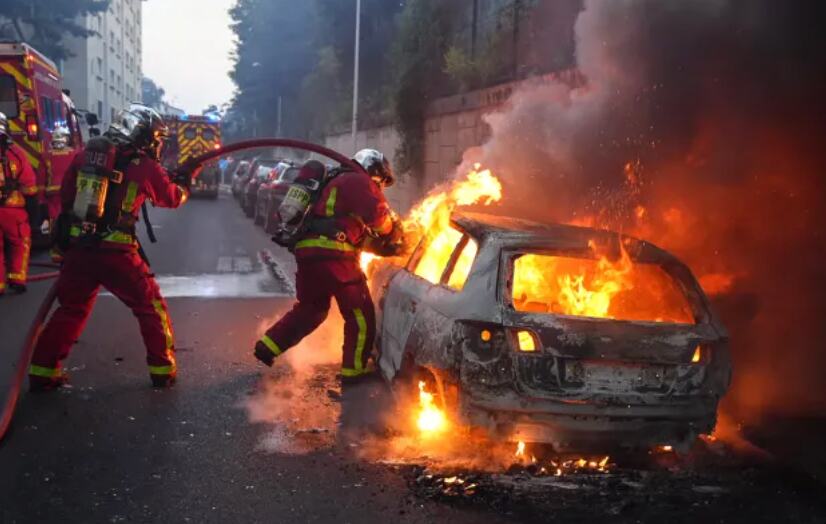Understanding Unrest in France: The Tragic Death of Nahel M. and its Aftermath
The tragic death of Nahel M., a French teenager shot dead by police during a traffic stop, has sparked five nights of unrest and violence in France. Nadia, the grandmother of the 17-year-old, pleaded for rioters to stop, urging them to “calm things down”.v
The tragic death of Nahel M., a French teenager shot dead by police during a traffic stop, has sparked five nights of unrest and violence in France. Nadia, the grandmother of the 17-year-old, pleaded for rioters to stop, urging them to “calm things down”.
President Emmanuel Macron expressed outrage at an attack on a suburban mayor’s home that injured family members, and is holding special security meetings to assess the reasons that led to the unrest. Despite the mass security deployment that has seen over 3,000 people detained, the violence appears to be decreasing.
Police made 78 arrests nationwide on Sunday, a significant decrease from 719 arrests the day before. Highlighting the seriousness of the rioting, Macron delayed his first state visit to Germany in 23 years.
The interior ministry was appalled after a burning car struck the home of the mayor of the Paris suburb of L’Hay-les-Roses, injuring his wife and one of his children. The attack represented a new stage of “horror and ignominy” in the unrest, and a preliminary investigation suggests the car was meant to ram the house and set it ablaze.
Macron has blamed social media for fueling violence, and French justice minister has warned that young people who share calls for violence on Snapchat or other apps could face prosecution.
The police and firefighting services have seen hundreds of injuries in the violence, but authorities haven’t said how many protesters have been hurt. The mass police deployment has been welcomed by some frightened residents of targeted neighbourhoods, but has further frustrated those who see police behaviour as the core of the crisis.
A young man of Senegalese descent said France would learn little from the latest unrest, and a Senegalese man selling locks and keys near the Eiffel Tower expressed his doubt that anything would change, citing “the discrimination is too profound”.
Despite the unrest, life in some parts of France is going on as usual, with tourists thronging to the Eiffel Tower and shopping malls bustling with customers from all walks of life. However, at the site of Nahel’s death, someone had painted “The police kill” on a bench.
Even a World War II monument commemorating Holocaust victims and members of the French Resistance was vandalized on the sidelines of a silent march to pay tribute to Nahel.
The officer accused of killing Nahel was given a preliminary charge of voluntary homicide. Thirteen people who didn’t comply with traffic stops were fatally shot by French police last year, and three this year, prompting demands for more accountability.
Nahel’s death reflects the flawed relations between the police and young people from working-class neighbourhoods, and the French government must take steps to address this issue.
The European Jewish Congress has denounced the vandalism of the WW2 monument as a “shameful act of disrespect for the memory of the victims of the Holocaust”. While France is still in the midst of social upheaval, Nadia’s plea for peace still holds true - it is only by calming things down that the country can move towards a time of greater understanding and justice.




